BBC's Organisational Behaviour: Analysis and Recommendations
VerifiedAdded on 2020/07/23
|19
|5086
|140
Report
AI Summary
This report provides a comprehensive analysis of organizational behavior within the British Broadcasting Corporation (BBC). It begins with an introduction to organizational behavior and its significance, followed by an examination of BBC's internal culture using Handy's cultural typology, focusing on power, task, person, and role cultures, and assessing the impact of culture, power, and politics on employee behavior. The report then delves into motivation theories, including content and process theories, such as Maslow's Hierarchy of Needs and Herzberg's Two-Factor Theory, and their application in enhancing team effectiveness within BBC. It identifies different types of teams at BBC and explores methods for creating effective teams, along with organizational theories to improve team performance and potential barriers to team success. The report concludes with recommendations for fostering a positive and productive work environment at BBC.
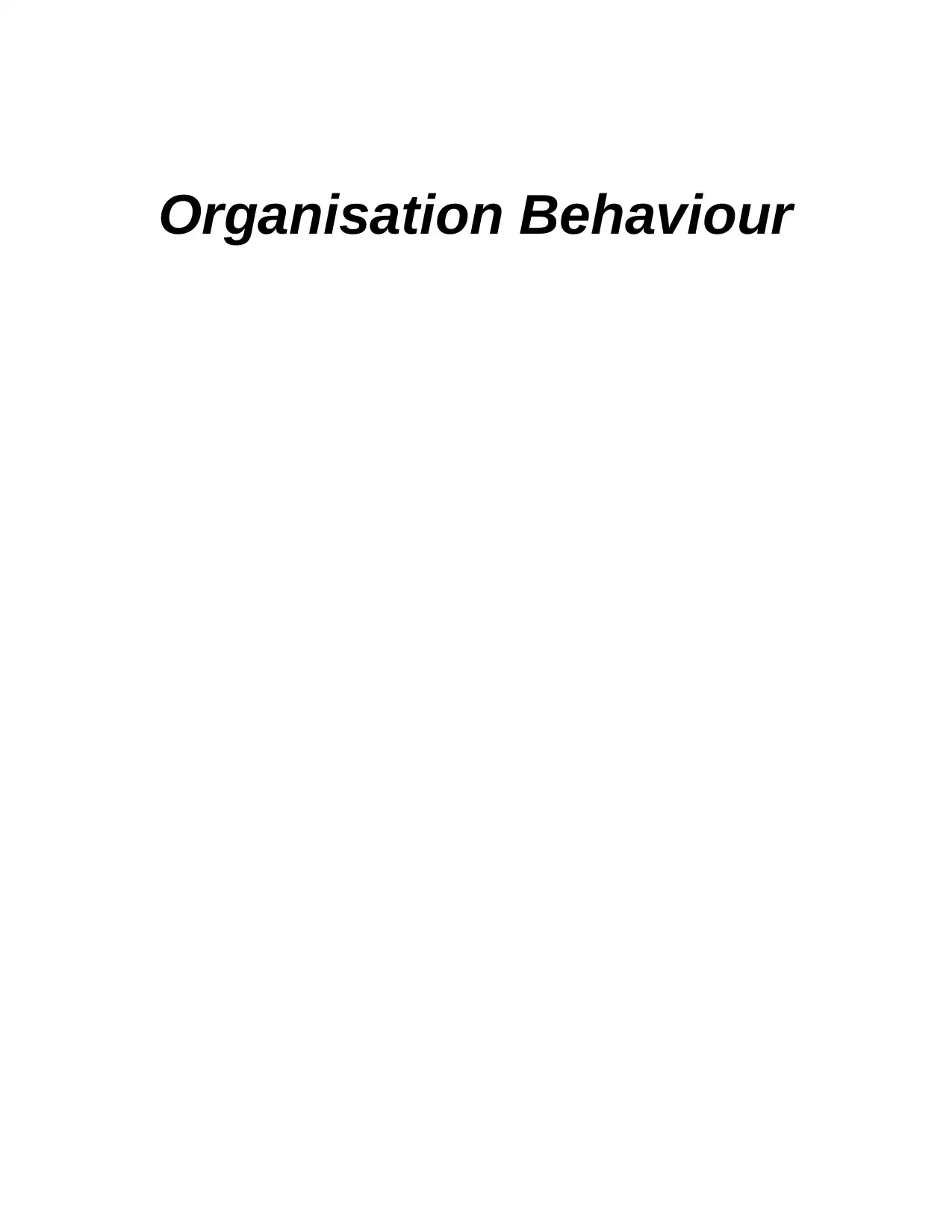
Organisation Behaviour
Paraphrase This Document
Need a fresh take? Get an instant paraphrase of this document with our AI Paraphraser
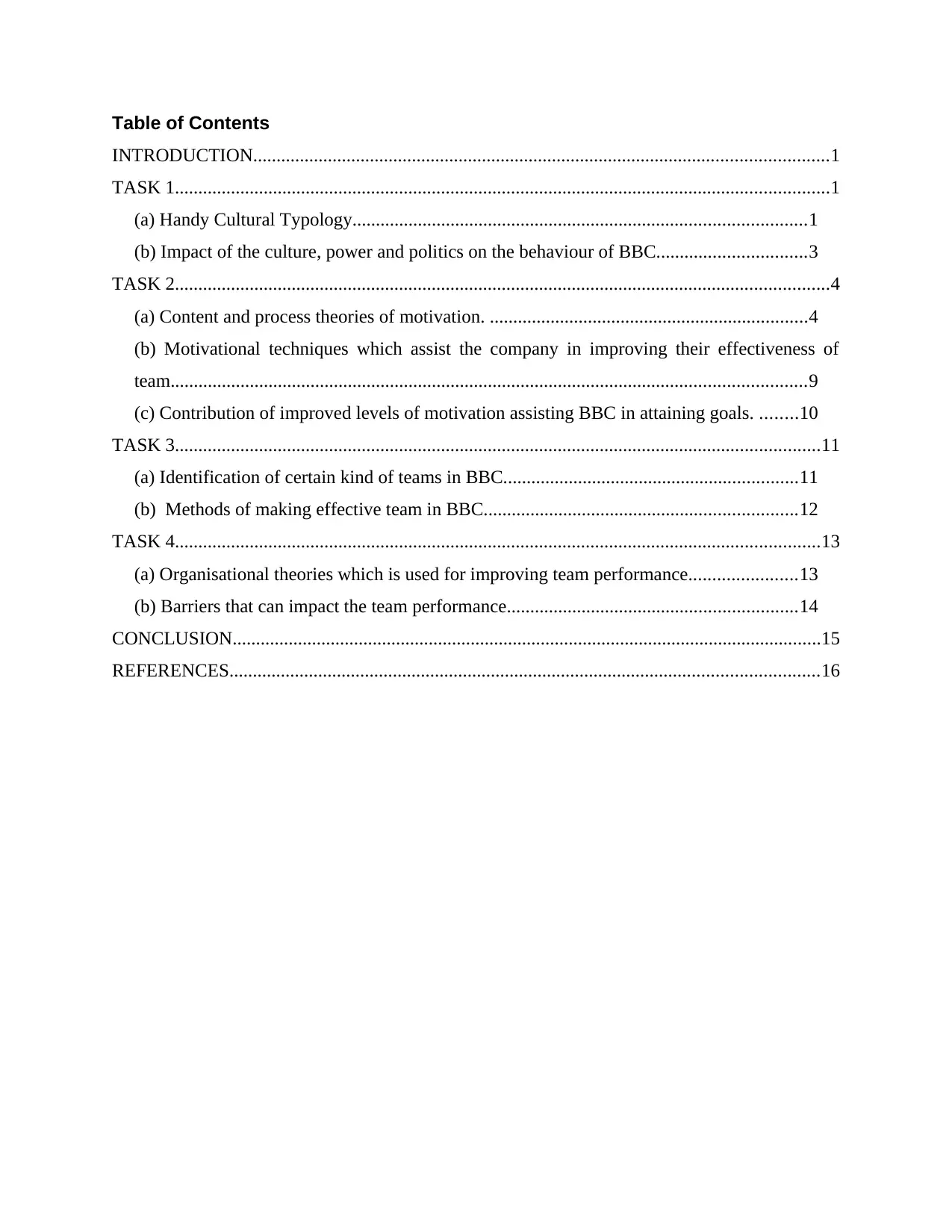
Table of Contents
INTRODUCTION...........................................................................................................................1
TASK 1............................................................................................................................................1
(a) Handy Cultural Typology.................................................................................................1
(b) Impact of the culture, power and politics on the behaviour of BBC................................3
TASK 2............................................................................................................................................4
(a) Content and process theories of motivation. ....................................................................4
(b) Motivational techniques which assist the company in improving their effectiveness of
team........................................................................................................................................9
(c) Contribution of improved levels of motivation assisting BBC in attaining goals. ........10
TASK 3..........................................................................................................................................11
(a) Identification of certain kind of teams in BBC...............................................................11
(b) Methods of making effective team in BBC...................................................................12
TASK 4..........................................................................................................................................13
(a) Organisational theories which is used for improving team performance.......................13
(b) Barriers that can impact the team performance..............................................................14
CONCLUSION..............................................................................................................................15
REFERENCES..............................................................................................................................16
INTRODUCTION...........................................................................................................................1
TASK 1............................................................................................................................................1
(a) Handy Cultural Typology.................................................................................................1
(b) Impact of the culture, power and politics on the behaviour of BBC................................3
TASK 2............................................................................................................................................4
(a) Content and process theories of motivation. ....................................................................4
(b) Motivational techniques which assist the company in improving their effectiveness of
team........................................................................................................................................9
(c) Contribution of improved levels of motivation assisting BBC in attaining goals. ........10
TASK 3..........................................................................................................................................11
(a) Identification of certain kind of teams in BBC...............................................................11
(b) Methods of making effective team in BBC...................................................................12
TASK 4..........................................................................................................................................13
(a) Organisational theories which is used for improving team performance.......................13
(b) Barriers that can impact the team performance..............................................................14
CONCLUSION..............................................................................................................................15
REFERENCES..............................................................................................................................16
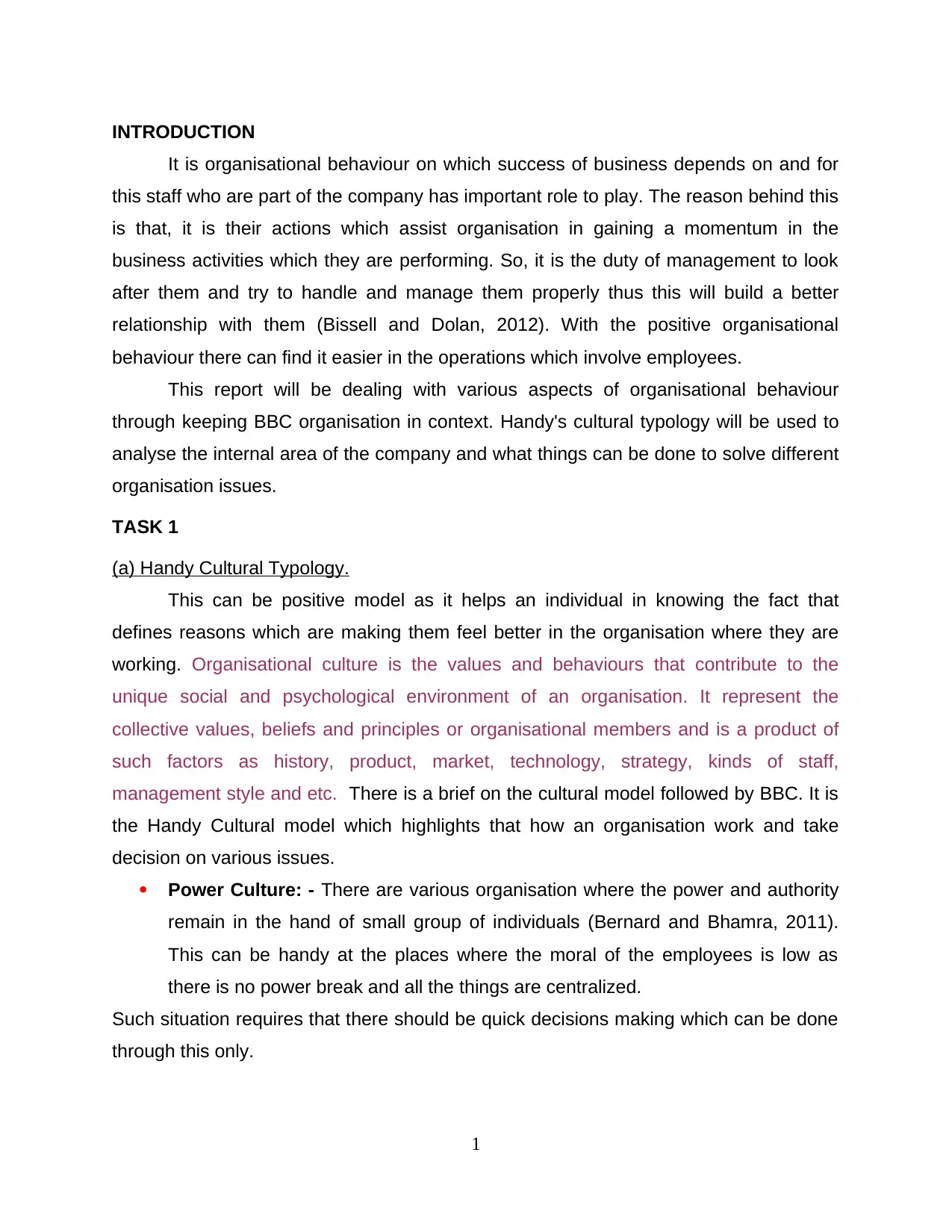
INTRODUCTION
It is organisational behaviour on which success of business depends on and for
this staff who are part of the company has important role to play. The reason behind this
is that, it is their actions which assist organisation in gaining a momentum in the
business activities which they are performing. So, it is the duty of management to look
after them and try to handle and manage them properly thus this will build a better
relationship with them (Bissell and Dolan, 2012). With the positive organisational
behaviour there can find it easier in the operations which involve employees.
This report will be dealing with various aspects of organisational behaviour
through keeping BBC organisation in context. Handy's cultural typology will be used to
analyse the internal area of the company and what things can be done to solve different
organisation issues.
TASK 1
(a) Handy Cultural Typology.
This can be positive model as it helps an individual in knowing the fact that
defines reasons which are making them feel better in the organisation where they are
working. Organisational culture is the values and behaviours that contribute to the
unique social and psychological environment of an organisation. It represent the
collective values, beliefs and principles or organisational members and is a product of
such factors as history, product, market, technology, strategy, kinds of staff,
management style and etc. There is a brief on the cultural model followed by BBC. It is
the Handy Cultural model which highlights that how an organisation work and take
decision on various issues.
Power Culture: - There are various organisation where the power and authority
remain in the hand of small group of individuals (Bernard and Bhamra, 2011).
This can be handy at the places where the moral of the employees is low as
there is no power break and all the things are centralized.
Such situation requires that there should be quick decisions making which can be done
through this only.
1
It is organisational behaviour on which success of business depends on and for
this staff who are part of the company has important role to play. The reason behind this
is that, it is their actions which assist organisation in gaining a momentum in the
business activities which they are performing. So, it is the duty of management to look
after them and try to handle and manage them properly thus this will build a better
relationship with them (Bissell and Dolan, 2012). With the positive organisational
behaviour there can find it easier in the operations which involve employees.
This report will be dealing with various aspects of organisational behaviour
through keeping BBC organisation in context. Handy's cultural typology will be used to
analyse the internal area of the company and what things can be done to solve different
organisation issues.
TASK 1
(a) Handy Cultural Typology.
This can be positive model as it helps an individual in knowing the fact that
defines reasons which are making them feel better in the organisation where they are
working. Organisational culture is the values and behaviours that contribute to the
unique social and psychological environment of an organisation. It represent the
collective values, beliefs and principles or organisational members and is a product of
such factors as history, product, market, technology, strategy, kinds of staff,
management style and etc. There is a brief on the cultural model followed by BBC. It is
the Handy Cultural model which highlights that how an organisation work and take
decision on various issues.
Power Culture: - There are various organisation where the power and authority
remain in the hand of small group of individuals (Bernard and Bhamra, 2011).
This can be handy at the places where the moral of the employees is low as
there is no power break and all the things are centralized.
Such situation requires that there should be quick decisions making which can be done
through this only.
1
⊘ This is a preview!⊘
Do you want full access?
Subscribe today to unlock all pages.

Trusted by 1+ million students worldwide
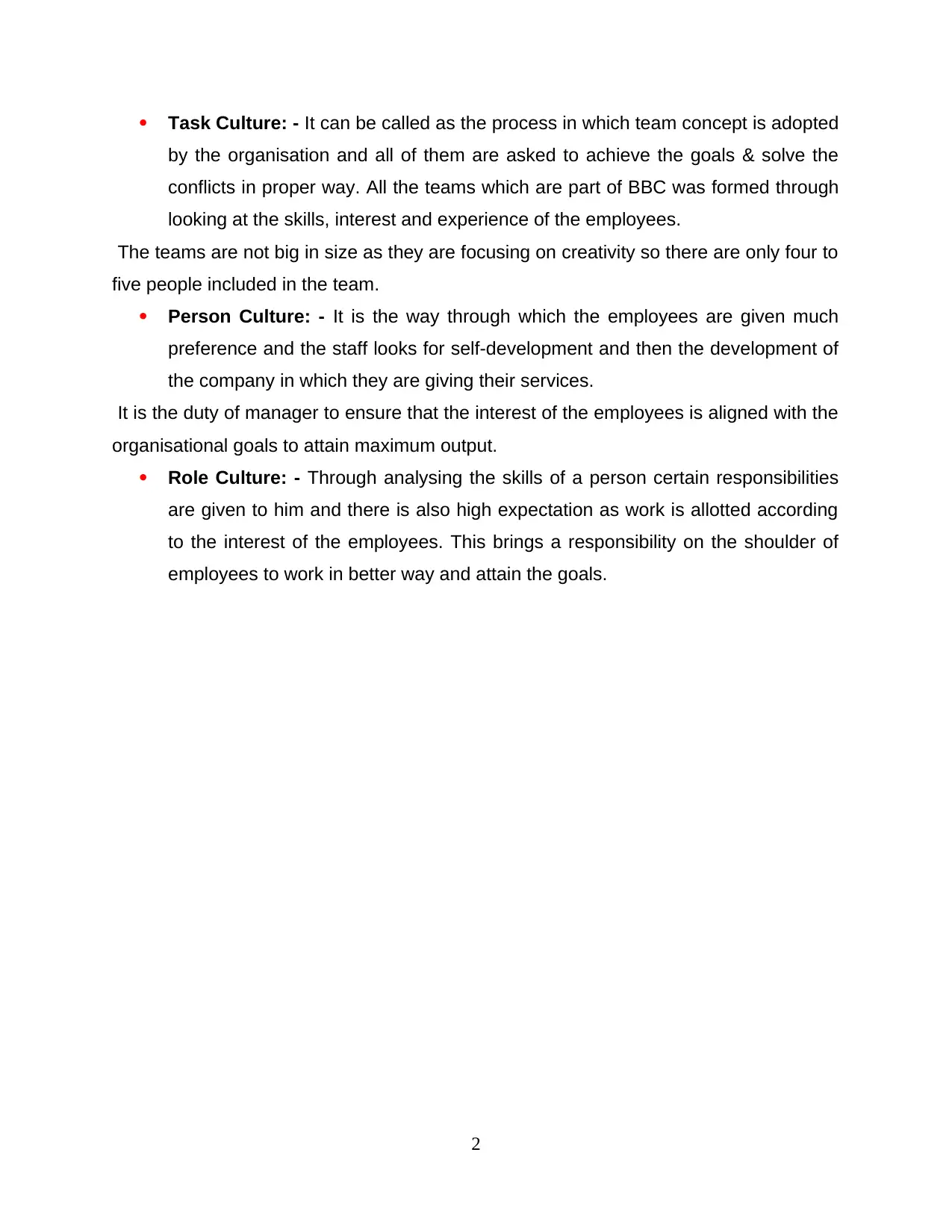
Task Culture: - It can be called as the process in which team concept is adopted
by the organisation and all of them are asked to achieve the goals & solve the
conflicts in proper way. All the teams which are part of BBC was formed through
looking at the skills, interest and experience of the employees.
The teams are not big in size as they are focusing on creativity so there are only four to
five people included in the team.
Person Culture: - It is the way through which the employees are given much
preference and the staff looks for self-development and then the development of
the company in which they are giving their services.
It is the duty of manager to ensure that the interest of the employees is aligned with the
organisational goals to attain maximum output.
Role Culture: - Through analysing the skills of a person certain responsibilities
are given to him and there is also high expectation as work is allotted according
to the interest of the employees. This brings a responsibility on the shoulder of
employees to work in better way and attain the goals.
2
by the organisation and all of them are asked to achieve the goals & solve the
conflicts in proper way. All the teams which are part of BBC was formed through
looking at the skills, interest and experience of the employees.
The teams are not big in size as they are focusing on creativity so there are only four to
five people included in the team.
Person Culture: - It is the way through which the employees are given much
preference and the staff looks for self-development and then the development of
the company in which they are giving their services.
It is the duty of manager to ensure that the interest of the employees is aligned with the
organisational goals to attain maximum output.
Role Culture: - Through analysing the skills of a person certain responsibilities
are given to him and there is also high expectation as work is allotted according
to the interest of the employees. This brings a responsibility on the shoulder of
employees to work in better way and attain the goals.
2
Paraphrase This Document
Need a fresh take? Get an instant paraphrase of this document with our AI Paraphraser
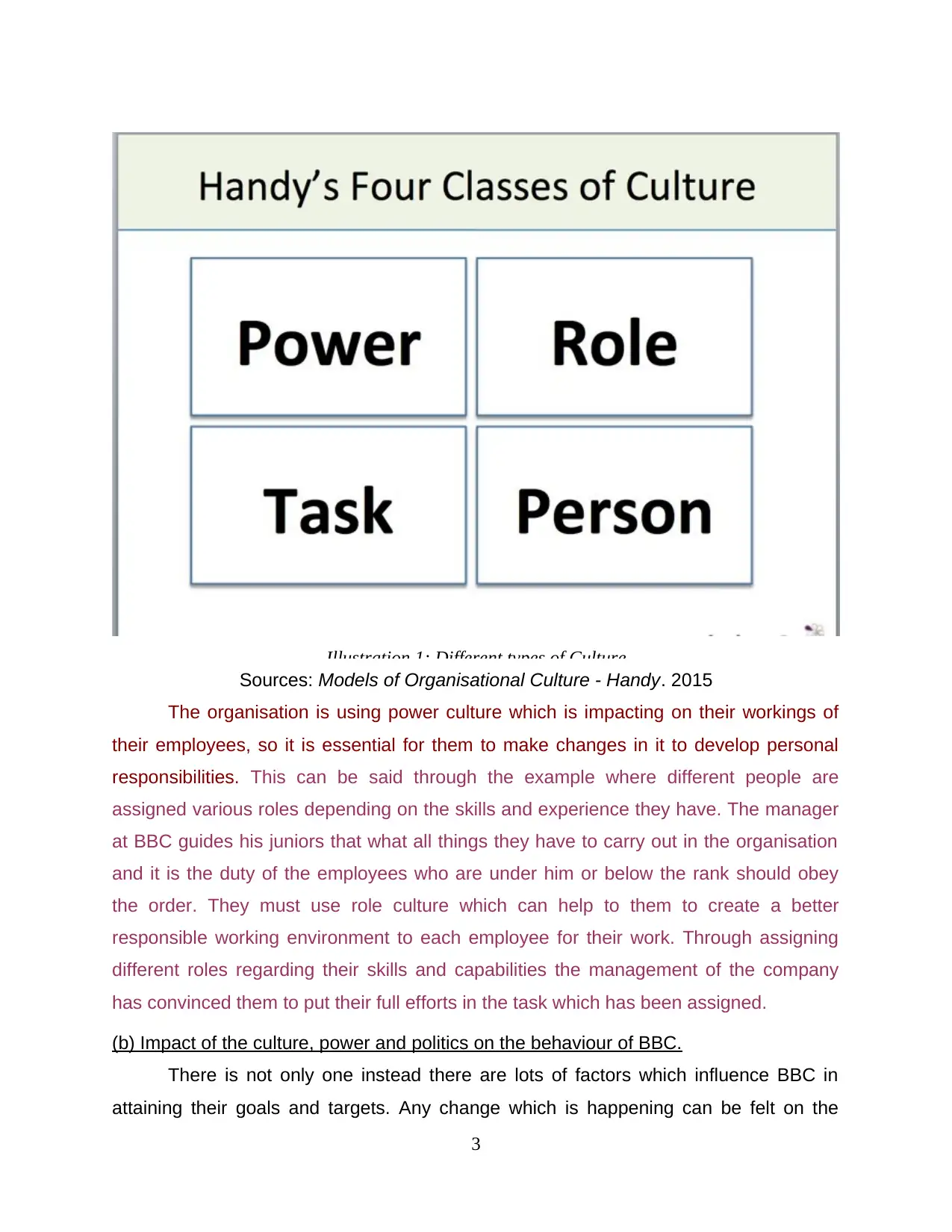
Sources: Models of Organisational Culture - Handy. 2015
The organisation is using power culture which is impacting on their workings of
their employees, so it is essential for them to make changes in it to develop personal
responsibilities. This can be said through the example where different people are
assigned various roles depending on the skills and experience they have. The manager
at BBC guides his juniors that what all things they have to carry out in the organisation
and it is the duty of the employees who are under him or below the rank should obey
the order. They must use role culture which can help to them to create a better
responsible working environment to each employee for their work. Through assigning
different roles regarding their skills and capabilities the management of the company
has convinced them to put their full efforts in the task which has been assigned.
(b) Impact of the culture, power and politics on the behaviour of BBC.
There is not only one instead there are lots of factors which influence BBC in
attaining their goals and targets. Any change which is happening can be felt on the
3
Illustration 1: Different types of Culture
The organisation is using power culture which is impacting on their workings of
their employees, so it is essential for them to make changes in it to develop personal
responsibilities. This can be said through the example where different people are
assigned various roles depending on the skills and experience they have. The manager
at BBC guides his juniors that what all things they have to carry out in the organisation
and it is the duty of the employees who are under him or below the rank should obey
the order. They must use role culture which can help to them to create a better
responsible working environment to each employee for their work. Through assigning
different roles regarding their skills and capabilities the management of the company
has convinced them to put their full efforts in the task which has been assigned.
(b) Impact of the culture, power and politics on the behaviour of BBC.
There is not only one instead there are lots of factors which influence BBC in
attaining their goals and targets. Any change which is happening can be felt on the
3
Illustration 1: Different types of Culture
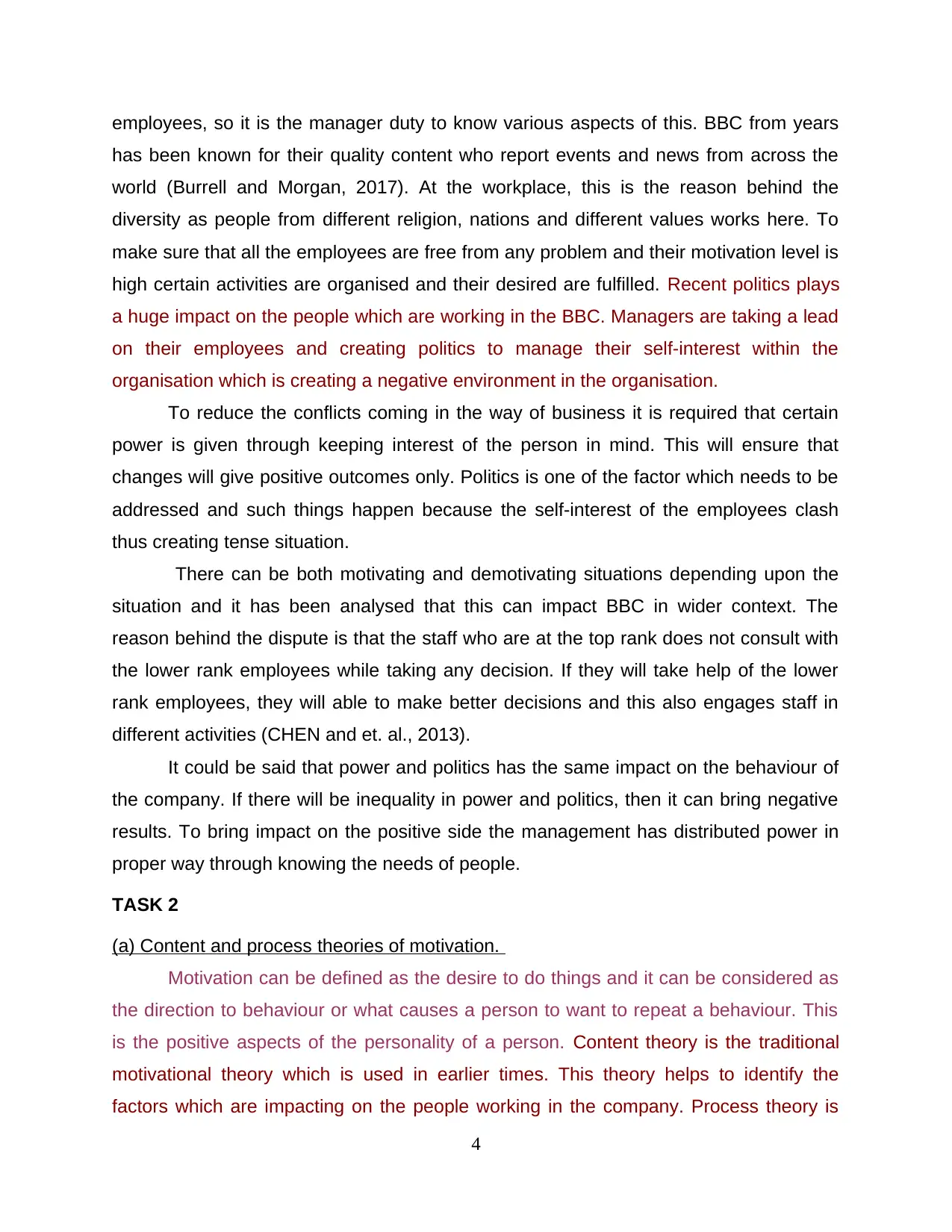
employees, so it is the manager duty to know various aspects of this. BBC from years
has been known for their quality content who report events and news from across the
world (Burrell and Morgan, 2017). At the workplace, this is the reason behind the
diversity as people from different religion, nations and different values works here. To
make sure that all the employees are free from any problem and their motivation level is
high certain activities are organised and their desired are fulfilled. Recent politics plays
a huge impact on the people which are working in the BBC. Managers are taking a lead
on their employees and creating politics to manage their self-interest within the
organisation which is creating a negative environment in the organisation.
To reduce the conflicts coming in the way of business it is required that certain
power is given through keeping interest of the person in mind. This will ensure that
changes will give positive outcomes only. Politics is one of the factor which needs to be
addressed and such things happen because the self-interest of the employees clash
thus creating tense situation.
There can be both motivating and demotivating situations depending upon the
situation and it has been analysed that this can impact BBC in wider context. The
reason behind the dispute is that the staff who are at the top rank does not consult with
the lower rank employees while taking any decision. If they will take help of the lower
rank employees, they will able to make better decisions and this also engages staff in
different activities (CHEN and et. al., 2013).
It could be said that power and politics has the same impact on the behaviour of
the company. If there will be inequality in power and politics, then it can bring negative
results. To bring impact on the positive side the management has distributed power in
proper way through knowing the needs of people.
TASK 2
(a) Content and process theories of motivation.
Motivation can be defined as the desire to do things and it can be considered as
the direction to behaviour or what causes a person to want to repeat a behaviour. This
is the positive aspects of the personality of a person. Content theory is the traditional
motivational theory which is used in earlier times. This theory helps to identify the
factors which are impacting on the people working in the company. Process theory is
4
has been known for their quality content who report events and news from across the
world (Burrell and Morgan, 2017). At the workplace, this is the reason behind the
diversity as people from different religion, nations and different values works here. To
make sure that all the employees are free from any problem and their motivation level is
high certain activities are organised and their desired are fulfilled. Recent politics plays
a huge impact on the people which are working in the BBC. Managers are taking a lead
on their employees and creating politics to manage their self-interest within the
organisation which is creating a negative environment in the organisation.
To reduce the conflicts coming in the way of business it is required that certain
power is given through keeping interest of the person in mind. This will ensure that
changes will give positive outcomes only. Politics is one of the factor which needs to be
addressed and such things happen because the self-interest of the employees clash
thus creating tense situation.
There can be both motivating and demotivating situations depending upon the
situation and it has been analysed that this can impact BBC in wider context. The
reason behind the dispute is that the staff who are at the top rank does not consult with
the lower rank employees while taking any decision. If they will take help of the lower
rank employees, they will able to make better decisions and this also engages staff in
different activities (CHEN and et. al., 2013).
It could be said that power and politics has the same impact on the behaviour of
the company. If there will be inequality in power and politics, then it can bring negative
results. To bring impact on the positive side the management has distributed power in
proper way through knowing the needs of people.
TASK 2
(a) Content and process theories of motivation.
Motivation can be defined as the desire to do things and it can be considered as
the direction to behaviour or what causes a person to want to repeat a behaviour. This
is the positive aspects of the personality of a person. Content theory is the traditional
motivational theory which is used in earlier times. This theory helps to identify the
factors which are impacting on the people working in the company. Process theory is
4
⊘ This is a preview!⊘
Do you want full access?
Subscribe today to unlock all pages.

Trusted by 1+ million students worldwide
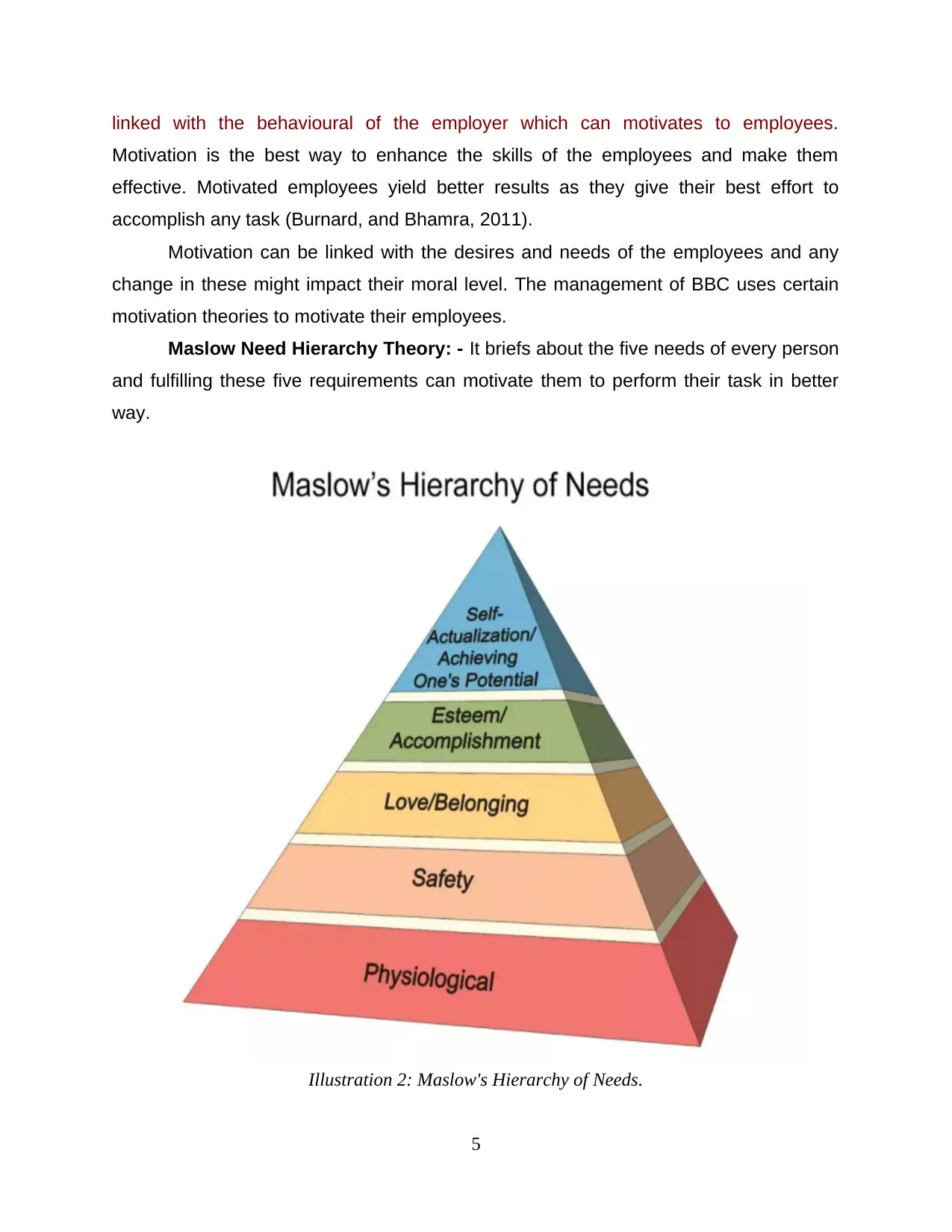
linked with the behavioural of the employer which can motivates to employees.
Motivation is the best way to enhance the skills of the employees and make them
effective. Motivated employees yield better results as they give their best effort to
accomplish any task (Burnard, and Bhamra, 2011).
Motivation can be linked with the desires and needs of the employees and any
change in these might impact their moral level. The management of BBC uses certain
motivation theories to motivate their employees.
Maslow Need Hierarchy Theory: - It briefs about the five needs of every person
and fulfilling these five requirements can motivate them to perform their task in better
way.
5
Illustration 2: Maslow's Hierarchy of Needs.
Motivation is the best way to enhance the skills of the employees and make them
effective. Motivated employees yield better results as they give their best effort to
accomplish any task (Burnard, and Bhamra, 2011).
Motivation can be linked with the desires and needs of the employees and any
change in these might impact their moral level. The management of BBC uses certain
motivation theories to motivate their employees.
Maslow Need Hierarchy Theory: - It briefs about the five needs of every person
and fulfilling these five requirements can motivate them to perform their task in better
way.
5
Illustration 2: Maslow's Hierarchy of Needs.
Paraphrase This Document
Need a fresh take? Get an instant paraphrase of this document with our AI Paraphraser
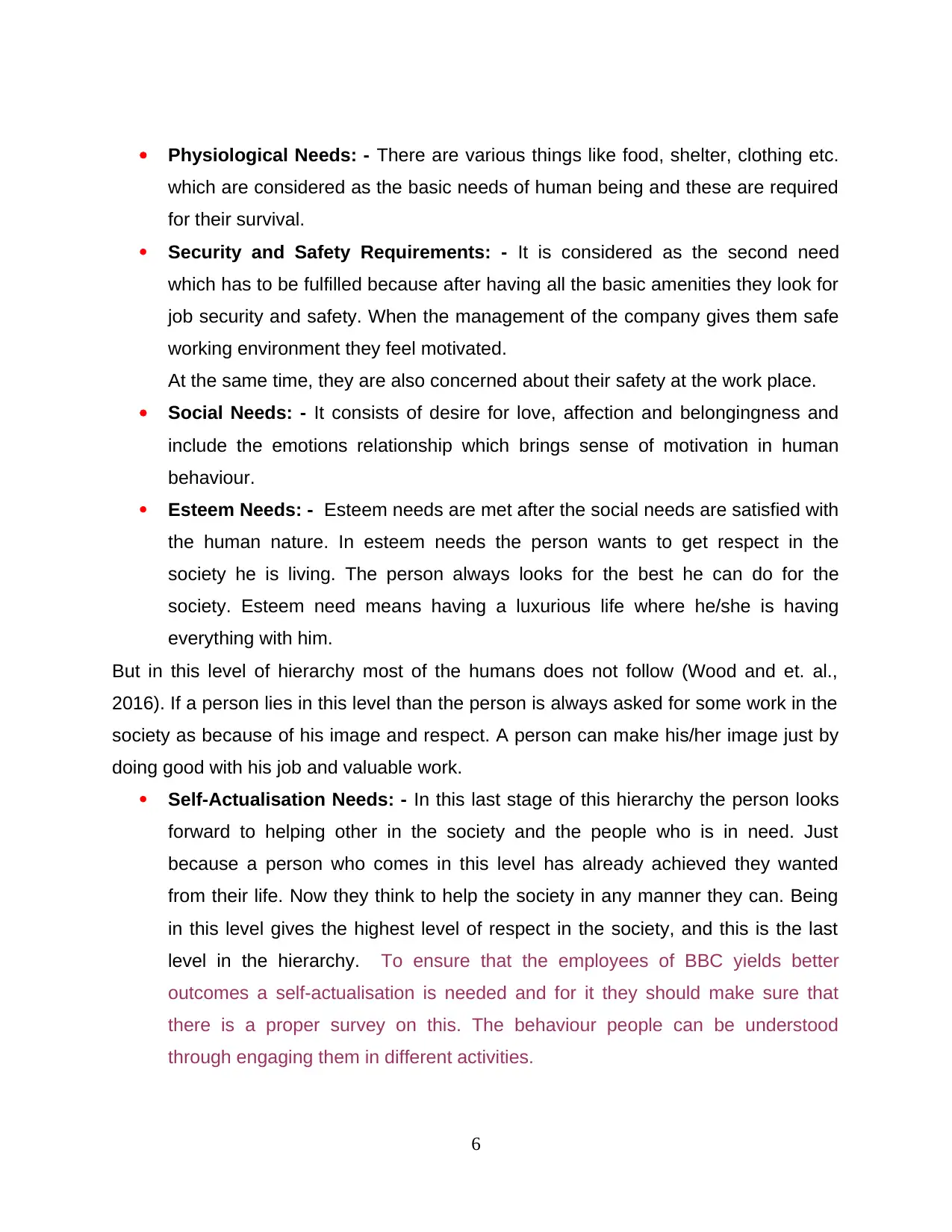
Physiological Needs: - There are various things like food, shelter, clothing etc.
which are considered as the basic needs of human being and these are required
for their survival.
Security and Safety Requirements: - It is considered as the second need
which has to be fulfilled because after having all the basic amenities they look for
job security and safety. When the management of the company gives them safe
working environment they feel motivated.
At the same time, they are also concerned about their safety at the work place.
Social Needs: - It consists of desire for love, affection and belongingness and
include the emotions relationship which brings sense of motivation in human
behaviour.
Esteem Needs: - Esteem needs are met after the social needs are satisfied with
the human nature. In esteem needs the person wants to get respect in the
society he is living. The person always looks for the best he can do for the
society. Esteem need means having a luxurious life where he/she is having
everything with him.
But in this level of hierarchy most of the humans does not follow (Wood and et. al.,
2016). If a person lies in this level than the person is always asked for some work in the
society as because of his image and respect. A person can make his/her image just by
doing good with his job and valuable work.
Self-Actualisation Needs: - In this last stage of this hierarchy the person looks
forward to helping other in the society and the people who is in need. Just
because a person who comes in this level has already achieved they wanted
from their life. Now they think to help the society in any manner they can. Being
in this level gives the highest level of respect in the society, and this is the last
level in the hierarchy. To ensure that the employees of BBC yields better
outcomes a self-actualisation is needed and for it they should make sure that
there is a proper survey on this. The behaviour people can be understood
through engaging them in different activities.
6
which are considered as the basic needs of human being and these are required
for their survival.
Security and Safety Requirements: - It is considered as the second need
which has to be fulfilled because after having all the basic amenities they look for
job security and safety. When the management of the company gives them safe
working environment they feel motivated.
At the same time, they are also concerned about their safety at the work place.
Social Needs: - It consists of desire for love, affection and belongingness and
include the emotions relationship which brings sense of motivation in human
behaviour.
Esteem Needs: - Esteem needs are met after the social needs are satisfied with
the human nature. In esteem needs the person wants to get respect in the
society he is living. The person always looks for the best he can do for the
society. Esteem need means having a luxurious life where he/she is having
everything with him.
But in this level of hierarchy most of the humans does not follow (Wood and et. al.,
2016). If a person lies in this level than the person is always asked for some work in the
society as because of his image and respect. A person can make his/her image just by
doing good with his job and valuable work.
Self-Actualisation Needs: - In this last stage of this hierarchy the person looks
forward to helping other in the society and the people who is in need. Just
because a person who comes in this level has already achieved they wanted
from their life. Now they think to help the society in any manner they can. Being
in this level gives the highest level of respect in the society, and this is the last
level in the hierarchy. To ensure that the employees of BBC yields better
outcomes a self-actualisation is needed and for it they should make sure that
there is a proper survey on this. The behaviour people can be understood
through engaging them in different activities.
6
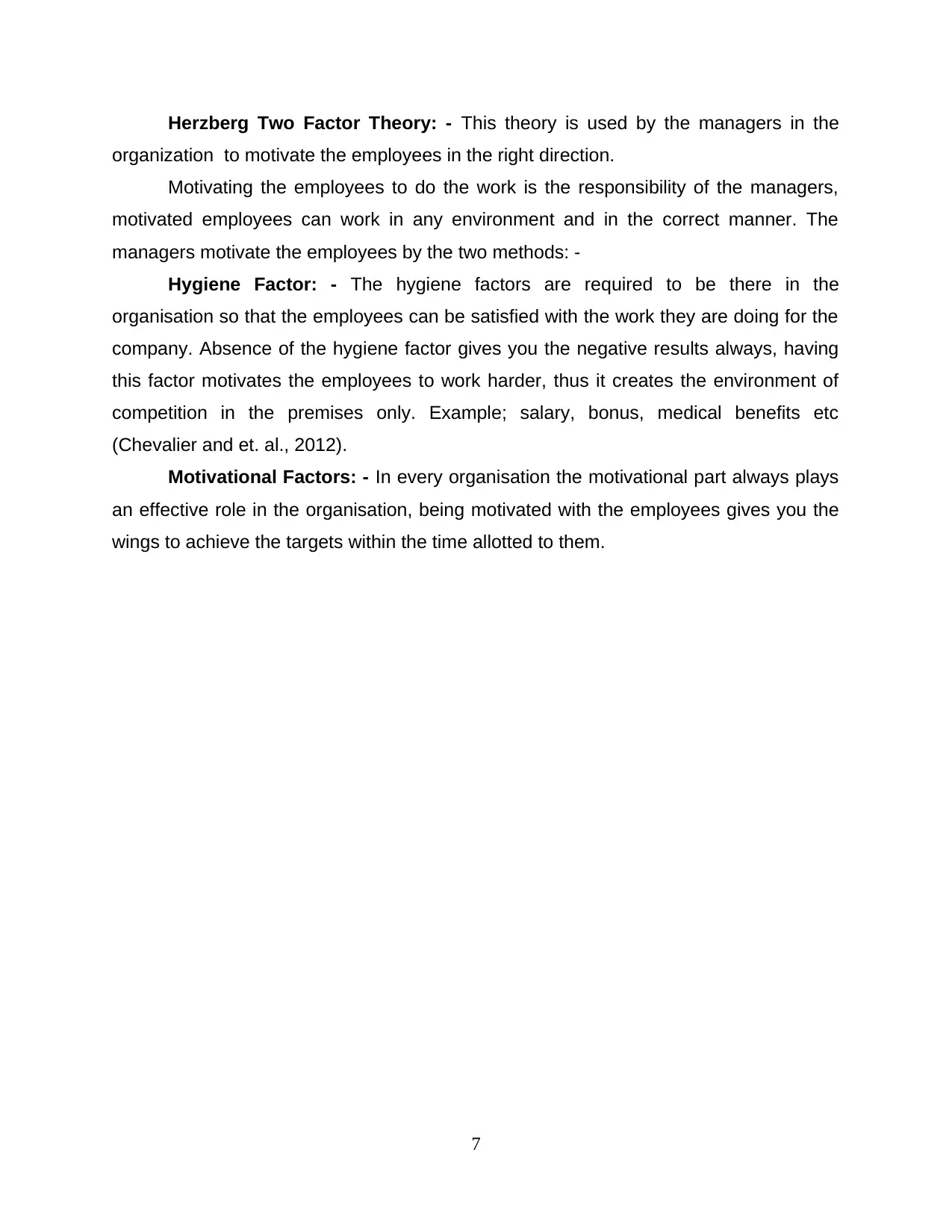
Herzberg Two Factor Theory: - This theory is used by the managers in the
organization to motivate the employees in the right direction.
Motivating the employees to do the work is the responsibility of the managers,
motivated employees can work in any environment and in the correct manner. The
managers motivate the employees by the two methods: -
Hygiene Factor: - The hygiene factors are required to be there in the
organisation so that the employees can be satisfied with the work they are doing for the
company. Absence of the hygiene factor gives you the negative results always, having
this factor motivates the employees to work harder, thus it creates the environment of
competition in the premises only. Example; salary, bonus, medical benefits etc
(Chevalier and et. al., 2012).
Motivational Factors: - In every organisation the motivational part always plays
an effective role in the organisation, being motivated with the employees gives you the
wings to achieve the targets within the time allotted to them.
7
organization to motivate the employees in the right direction.
Motivating the employees to do the work is the responsibility of the managers,
motivated employees can work in any environment and in the correct manner. The
managers motivate the employees by the two methods: -
Hygiene Factor: - The hygiene factors are required to be there in the
organisation so that the employees can be satisfied with the work they are doing for the
company. Absence of the hygiene factor gives you the negative results always, having
this factor motivates the employees to work harder, thus it creates the environment of
competition in the premises only. Example; salary, bonus, medical benefits etc
(Chevalier and et. al., 2012).
Motivational Factors: - In every organisation the motivational part always plays
an effective role in the organisation, being motivated with the employees gives you the
wings to achieve the targets within the time allotted to them.
7
⊘ This is a preview!⊘
Do you want full access?
Subscribe today to unlock all pages.

Trusted by 1+ million students worldwide
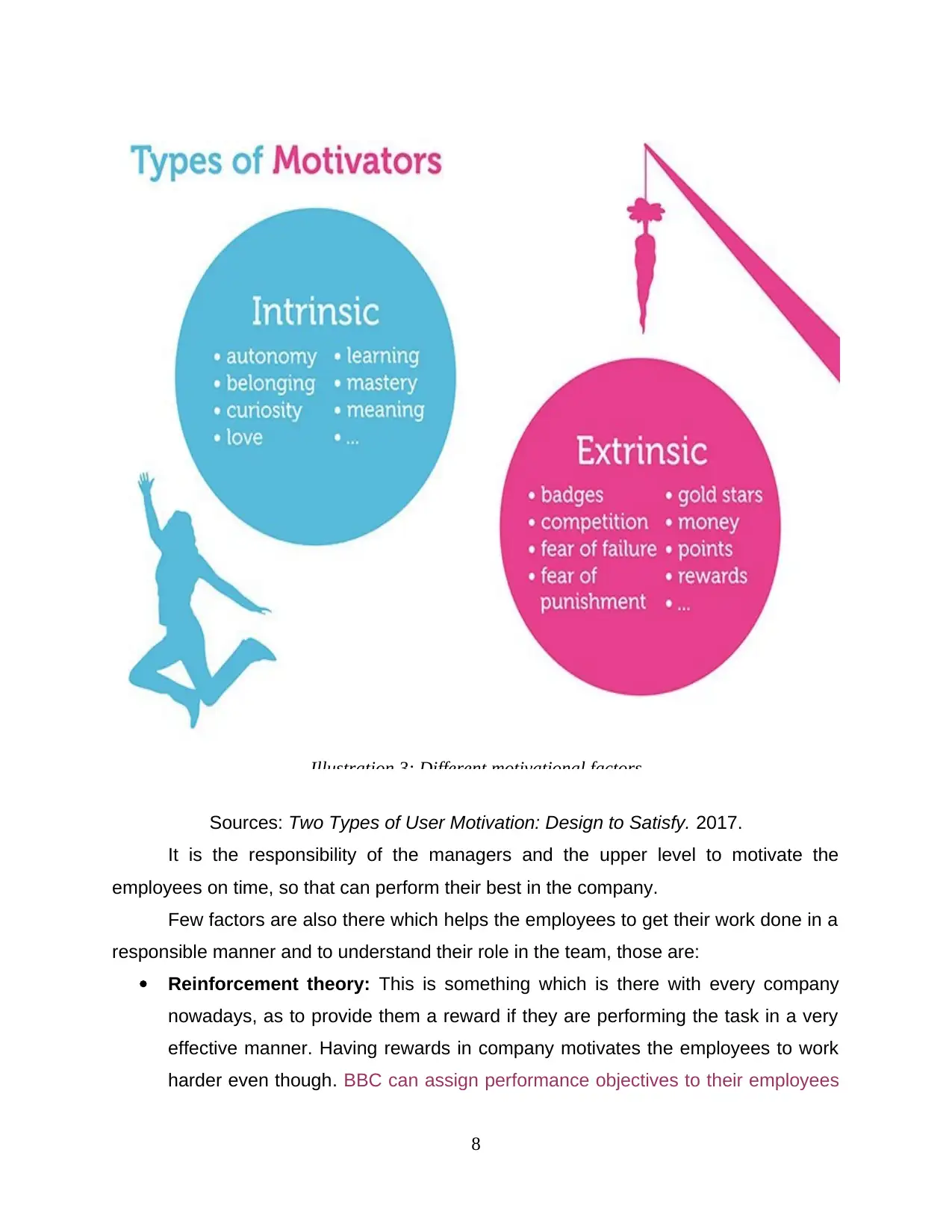
Sources: Two Types of User Motivation: Design to Satisfy. 2017.
It is the responsibility of the managers and the upper level to motivate the
employees on time, so that can perform their best in the company.
Few factors are also there which helps the employees to get their work done in a
responsible manner and to understand their role in the team, those are:
Reinforcement theory: This is something which is there with every company
nowadays, as to provide them a reward if they are performing the task in a very
effective manner. Having rewards in company motivates the employees to work
harder even though. BBC can assign performance objectives to their employees
8
Illustration 3: Different motivational factors
It is the responsibility of the managers and the upper level to motivate the
employees on time, so that can perform their best in the company.
Few factors are also there which helps the employees to get their work done in a
responsible manner and to understand their role in the team, those are:
Reinforcement theory: This is something which is there with every company
nowadays, as to provide them a reward if they are performing the task in a very
effective manner. Having rewards in company motivates the employees to work
harder even though. BBC can assign performance objectives to their employees
8
Illustration 3: Different motivational factors
Paraphrase This Document
Need a fresh take? Get an instant paraphrase of this document with our AI Paraphraser
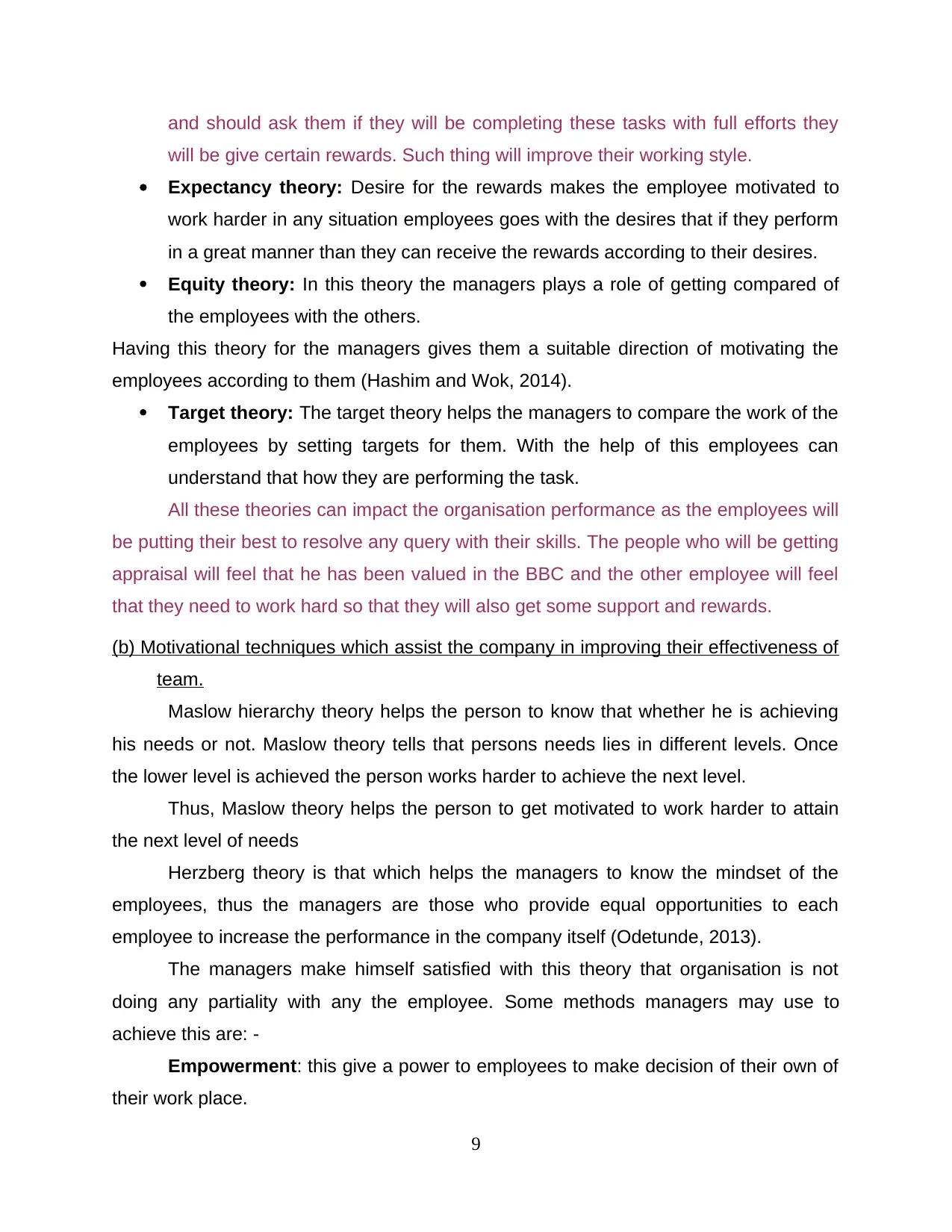
and should ask them if they will be completing these tasks with full efforts they
will be give certain rewards. Such thing will improve their working style.
Expectancy theory: Desire for the rewards makes the employee motivated to
work harder in any situation employees goes with the desires that if they perform
in a great manner than they can receive the rewards according to their desires.
Equity theory: In this theory the managers plays a role of getting compared of
the employees with the others.
Having this theory for the managers gives them a suitable direction of motivating the
employees according to them (Hashim and Wok, 2014).
Target theory: The target theory helps the managers to compare the work of the
employees by setting targets for them. With the help of this employees can
understand that how they are performing the task.
All these theories can impact the organisation performance as the employees will
be putting their best to resolve any query with their skills. The people who will be getting
appraisal will feel that he has been valued in the BBC and the other employee will feel
that they need to work hard so that they will also get some support and rewards.
(b) Motivational techniques which assist the company in improving their effectiveness of
team.
Maslow hierarchy theory helps the person to know that whether he is achieving
his needs or not. Maslow theory tells that persons needs lies in different levels. Once
the lower level is achieved the person works harder to achieve the next level.
Thus, Maslow theory helps the person to get motivated to work harder to attain
the next level of needs
Herzberg theory is that which helps the managers to know the mindset of the
employees, thus the managers are those who provide equal opportunities to each
employee to increase the performance in the company itself (Odetunde, 2013).
The managers make himself satisfied with this theory that organisation is not
doing any partiality with any the employee. Some methods managers may use to
achieve this are: -
Empowerment: this give a power to employees to make decision of their own of
their work place.
9
will be give certain rewards. Such thing will improve their working style.
Expectancy theory: Desire for the rewards makes the employee motivated to
work harder in any situation employees goes with the desires that if they perform
in a great manner than they can receive the rewards according to their desires.
Equity theory: In this theory the managers plays a role of getting compared of
the employees with the others.
Having this theory for the managers gives them a suitable direction of motivating the
employees according to them (Hashim and Wok, 2014).
Target theory: The target theory helps the managers to compare the work of the
employees by setting targets for them. With the help of this employees can
understand that how they are performing the task.
All these theories can impact the organisation performance as the employees will
be putting their best to resolve any query with their skills. The people who will be getting
appraisal will feel that he has been valued in the BBC and the other employee will feel
that they need to work hard so that they will also get some support and rewards.
(b) Motivational techniques which assist the company in improving their effectiveness of
team.
Maslow hierarchy theory helps the person to know that whether he is achieving
his needs or not. Maslow theory tells that persons needs lies in different levels. Once
the lower level is achieved the person works harder to achieve the next level.
Thus, Maslow theory helps the person to get motivated to work harder to attain
the next level of needs
Herzberg theory is that which helps the managers to know the mindset of the
employees, thus the managers are those who provide equal opportunities to each
employee to increase the performance in the company itself (Odetunde, 2013).
The managers make himself satisfied with this theory that organisation is not
doing any partiality with any the employee. Some methods managers may use to
achieve this are: -
Empowerment: this give a power to employees to make decision of their own of
their work place.
9
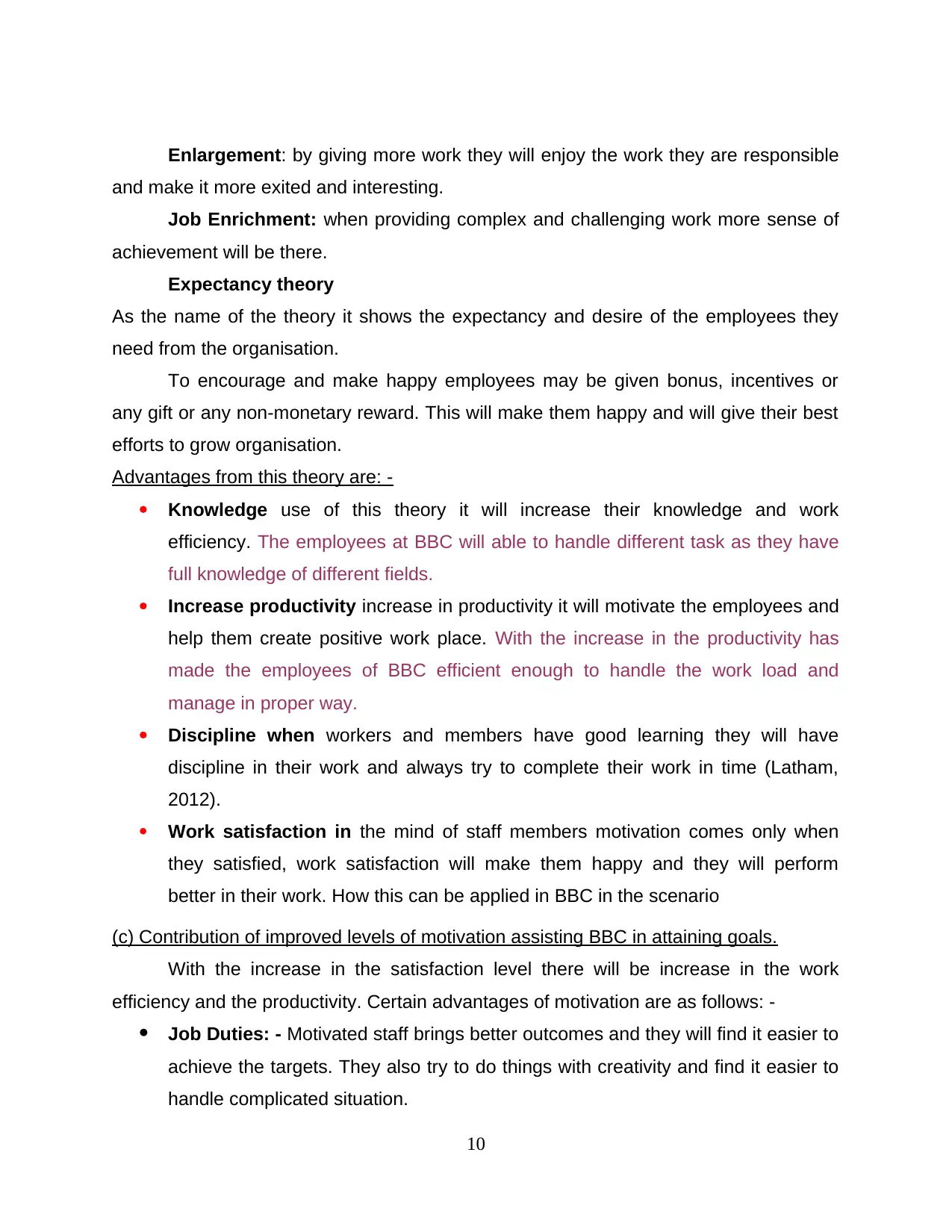
Enlargement: by giving more work they will enjoy the work they are responsible
and make it more exited and interesting.
Job Enrichment: when providing complex and challenging work more sense of
achievement will be there.
Expectancy theory
As the name of the theory it shows the expectancy and desire of the employees they
need from the organisation.
To encourage and make happy employees may be given bonus, incentives or
any gift or any non-monetary reward. This will make them happy and will give their best
efforts to grow organisation.
Advantages from this theory are: -
Knowledge use of this theory it will increase their knowledge and work
efficiency. The employees at BBC will able to handle different task as they have
full knowledge of different fields.
Increase productivity increase in productivity it will motivate the employees and
help them create positive work place. With the increase in the productivity has
made the employees of BBC efficient enough to handle the work load and
manage in proper way.
Discipline when workers and members have good learning they will have
discipline in their work and always try to complete their work in time (Latham,
2012).
Work satisfaction in the mind of staff members motivation comes only when
they satisfied, work satisfaction will make them happy and they will perform
better in their work. How this can be applied in BBC in the scenario
(c) Contribution of improved levels of motivation assisting BBC in attaining goals.
With the increase in the satisfaction level there will be increase in the work
efficiency and the productivity. Certain advantages of motivation are as follows: -
Job Duties: - Motivated staff brings better outcomes and they will find it easier to
achieve the targets. They also try to do things with creativity and find it easier to
handle complicated situation.
10
and make it more exited and interesting.
Job Enrichment: when providing complex and challenging work more sense of
achievement will be there.
Expectancy theory
As the name of the theory it shows the expectancy and desire of the employees they
need from the organisation.
To encourage and make happy employees may be given bonus, incentives or
any gift or any non-monetary reward. This will make them happy and will give their best
efforts to grow organisation.
Advantages from this theory are: -
Knowledge use of this theory it will increase their knowledge and work
efficiency. The employees at BBC will able to handle different task as they have
full knowledge of different fields.
Increase productivity increase in productivity it will motivate the employees and
help them create positive work place. With the increase in the productivity has
made the employees of BBC efficient enough to handle the work load and
manage in proper way.
Discipline when workers and members have good learning they will have
discipline in their work and always try to complete their work in time (Latham,
2012).
Work satisfaction in the mind of staff members motivation comes only when
they satisfied, work satisfaction will make them happy and they will perform
better in their work. How this can be applied in BBC in the scenario
(c) Contribution of improved levels of motivation assisting BBC in attaining goals.
With the increase in the satisfaction level there will be increase in the work
efficiency and the productivity. Certain advantages of motivation are as follows: -
Job Duties: - Motivated staff brings better outcomes and they will find it easier to
achieve the targets. They also try to do things with creativity and find it easier to
handle complicated situation.
10
⊘ This is a preview!⊘
Do you want full access?
Subscribe today to unlock all pages.

Trusted by 1+ million students worldwide
1 out of 19
Related Documents
Your All-in-One AI-Powered Toolkit for Academic Success.
+13062052269
info@desklib.com
Available 24*7 on WhatsApp / Email
![[object Object]](/_next/static/media/star-bottom.7253800d.svg)
Unlock your academic potential
Copyright © 2020–2026 A2Z Services. All Rights Reserved. Developed and managed by ZUCOL.





